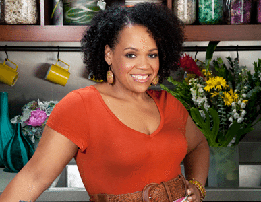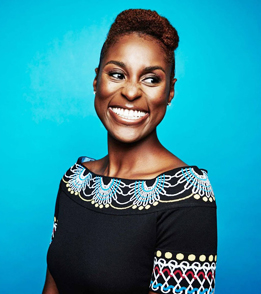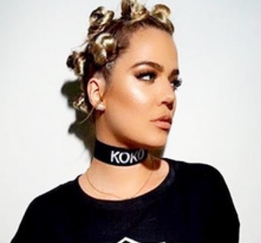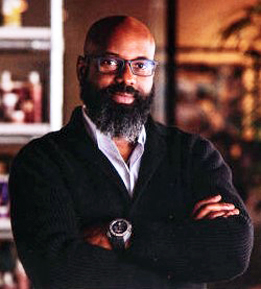|
Fros, Fashions and Finds:
Changing the Face of Black Beauty
By Megan Davis
The Truth Contributor
By now, we
have seen it, the rise of the black beauty industry, ignited
by the natural hair movement. A completely different genre
of beauty and business in the black community that
celebrates melanin, hair that defies gravity, and a culture
that is deeper than fried chicken, watermelon and any other
stereotypical idea of who black people are. Dominated by
black women who, from the heart of their kitchens, worked
diligently to create a new recipe for beauty and success,
the natural hair industry has created layers of businesses
that are for us, by us, unapologetically.
It started
with blogs often powered by google, with cute usernames like
“naturalgirl” or “curlydiva.” These blogs followed
individual journeys of the stages of transitioning to
natural hair and beyond. What came next were the meet-ups,
which are events that naturals could come together in their
communities to learn about natural hair care and learn new
techniques and styles. In Toledo, these have been held at
libraries and other venues for 10 years. As more women began
to embrace their natural hair, they also endeavored to be
more health conscious in their choice of foods and hair and
skin care products. Here is where people like the creators
of Carol’s Daughter, Miss Jessie’s and Shea Moisture began
to grow.
Companies
like these all started in the homes of mixmasters, blending
organic ingredients together to meet the growing needs of
moisture, maintenance and manageability for the natural hair
community. These companies have evolved from selling
products out of their homes and car trunks to becoming
instant successes with e-commerce websites where others
outside their own communities could buy their products as
well. Enter the Home Shopping Network which gave Lisa Price,
Brooklyn native and creator of Carol’s Daughter, first place
in natural hair care when her products became the standard
for black women everywhere who wanted something made by
someone that looked like us. With some special funding and
brand ambassadors like Jada Pinkett-Smith, her products
became the upscale line for naturals. It was as if natural
hair care went “Hollywood” and natural black hair had
finally arrived.
Then from
Long Island, New York, there came a man named Dennis
Richelieu, founder of Nubian Heritage skin care and Shea
Moisture hair care products. He, along with his grandmother
and college friend, took homemade recipes and preparations
to the next level with a brand rooted in his African
heritage and became a household name in black hair care
practically overnight. His products are even more widely
available than others today, thanks to an infusion of
investments from unlikely sources that has or his company in
jeopardy. But we will come back to this. |

Lisa Price, Carol's Daughter

Issa Rae

Khloe Kardashian wearing Bantu Knots

Dennis Richelieu |
|
Maybe it’s
a New York thing, but there is also Miss Jessie’s, a company
started by sisters Miko and Titi Branch. Their success was
made from recipes in their kitchen also, trying out their
concoctions on clients in their salon. Their products were
all the rage until the market exploded and more mom and pop
product companies rose to the occasion to establish their
own companies to serve their communities. Miss Jessie’s was
one of the highest-priced natural hair companies of this
kind.
When these
companies rose to fame so quickly, natural hair expos and
conventions, would become popular events that featured
several vendors, small business owners and a combination of
entertainment and education. It’s here where small business
development took on a life of its own. Expos like the Ohio
Natural Hair, Health & Beauty Expo, held in Toledo annual,
gave business owners an affordable opportunity to display
their goods and services to the community and to connect
consumers that a small business may otherwise not have been
able to reach. The idea of these types of events has been to
advertise your business to a large group of people in one
day, giving each more than one way to connect with a
business: meeting the owner, seeing and touching the
products and learning how their good or service can work for
the consumer; something that ads, especially social media
shares aren’t always able to accomplish.
This is
also how word of mouth, referrals and networking have made
their comeback. Businesses have new platforms at local
events to be showcased and the impact it has had on the
Industry is immense. Coupled with changing laws in some
states for natural hair stylists who are being emancipated
from unnecessary licensing requirements, the new, but old
age of each one reach one has powered the new black beauty
industry.
Gaining
momentum, natural hair styles have been trending once
celebrities like Issa Rae, Viola Davis and Tracee Ellis Ross
began embracing their roots publicly. Insert cultural
appropriation here. A movement that was established for
melanated people with Afro hair, was growing around the
world. That movement became the industry that remains viable
even though the threat of a certain privilege is looming
above it. Because later came the cosmetology industry who
developed “professional” products that had an even higher
price tag, discouraging consumers from buying homemade,
stating the products weren’t balanced enough for black hair.
Insert the side eye emoji here, and hold it.
Picture
it, New York fashion week and a barrage of pale-skinned
models are walking the runway donning dreadlocks and Bantu
Knots, images that women of color were outraged by not only
because they weren’t represented, but also because it was as
if someone snatched their child and paraded them around as
if they were the “White Savior” rescuing them from
themselves. This debut of African American hairstyles
yielded a series of Youtube videos and short tutorials of
more non-melanated women teaching their viewers how to
achieve these styles. Marc Jacobs, a fashion designer who
has been accused of cultural appropriation more than once,
was under siege in a social media firestorm over his choice
in hairstyles for his runway looks. His response was “funny
how you don’t criticize women of color for straightening
their hair.” Touche, Mr. Jacobs.
Cultural
appropriation too, has taken on a new life. Natural women
were just embracing their tight coils, kinks and waves when
all of a sudden, old hair care lines that previously catered
to the relaxed consumer, were now developing their own curly
hair lines for women of color. The problem with this is the
size of these companies like Dark and Lovely, Pantene, Cream
of Natural and others; their ability to get on retail
shelves has been and still is a lot easier than smaller
companies to do. They may be behind in knowing black beauty
trends, but their dollars and influence in the beauty market
spread faster and smoother. Even with Miss Jessie’s,
Carol’s Daughter and Shea Moisture, you most often had to
order online, during a time where people of color were very
apprehensive about purchasing anything online.
For the
few natural hair product companies that saw massive success,
it seemed that the buck stopped with those main three. While
there are now hundreds of other smaller companies, that are
chugging their way down the rail to success, the
aforementioned companies pushed their product out just in
the nick of time. In order to stay relevant and successful,
Carol’s Daughter and Shea Moisture have been under much
scrutiny for their recent financial partnerships with
companies like L’Oreal, Bain Capital (which was noted to be
linked to Mitt Romney) and Unilever, companies that are
funded by “White Dollars” that provided an infusion of cash
to these businesses in order to expand and be placed in more
retail stores around the world. These decisions have left
the conscious black shopper in a lurch over supporting
companies that “sold out” to “the man.” People noticed, as
soon as these deals were made, that their marketing changed
completely and, for those who purchased products regularly,
also noticed that there was a change in the formula.
In the
spring of 2017, an online ad by Shea Moisture showed several
white women with wavy or curly hair, complaining about
manageability and maintenance until they began using the
products. As quickly as this became a viral video, black
women were boycotting Shea Moisture on-the-spot, and began
searching for other black-owned companies to support. Of
course, there were questions raised when Dove did a similar
thing that didn’t receive the same response. Perhaps because
it was expected from a company like that to create an ad
that disgraced the African-American esthetic, but when it
was black, it was personal. And we still watch BET...To
date, Shea Moisture barely made it past that debacle which
has claimed thousands, maybe millions of consumer dollars,
and now they have been acquired by a UK company, Unilever.
Quite possibly, they had to sell in order to stay on the
market at all after that lest they fold under the pressure
of letting women of color down.
With
larger corporations trying to get in on the success of what
the natural hair movement has created, consumers are
constantly doing research and also standing on opposing
sides at times. Because the corporations have implanted
their dollars into black companies, they have watered down
their products and lowered the prices to sell more, but
never as cheap as their own products. What used to sound
like exotic, one of a kind formulas in Carol’s Daughter
products such as Monoi oil, has now been emulated across
retail shelves in Sally’s, Walmart and all the beauty supply
stores across the country at a fraction of the price of
“our” products. Consumers are constantly faced with trying
to finding more for less, and the major corporations who
have pushed out their own “natural” lines, make it hard for
people to choose.
If these
things aren’t enough to see how the face of Black Beauty is
being changed, then perhaps this last example will confirm
how something naturally ours is being kidnapped by those who
want greenbacks off “our” backs. Locs, which is a hairstyle
that requires a commitment from an individual to grow down
to their waist over a period of seven-10 years, can be
purchased 20 for $5.99 at any local non-chain beauty
supplier. The loc jewelry that black women were making by
hand and selling online on sites such as Etsy, which
celebrates handmade artisans, can now be purchased five or
so for $0.99. Shea butter that we can source fair trade from
vendors who have partnerships with the people of Ghana is
now being processed and stretched out and sold in small
containers for $3.00 or more. And if your Afro doesn’t have
defined curls, you can buy a bag of them for $4.99 and
attach it to your own hair for free if you watch a how-to
video online.
The curls
that we grow naturally, in all their glory, are being worn
by white models and actresses of color, by way of wigs and
weaves, both items that discourage women from wearing their
own hair. Let’s also throw in the fact that what once was a
crown of glory, the Afro, is now a banner of shame since
product companies have developed several items that stretch,
elongate and smooth naturally curly hair to make it more
presentable and manageable. The natural hair movement
birthed an industry that was made for us by us, growing
exponentially between 2007-2017 and is now being
appropriated and monopolized by white and light brown
people, the lowest bidders, a repeat of the Madam C.J.
Walker era. Black Beauty has changed faces again, but if we
have changed the industry twice before, we can do it again.
Stay tuned for the next Fros, Fashions and Finds where we
discover how.
|